At College of Medicine – Tucson, Female Faculty Foster Growth
Over two decades, Women in Academic Medicine has helped reshape the College of Medicine – Tucson’s professional culture.
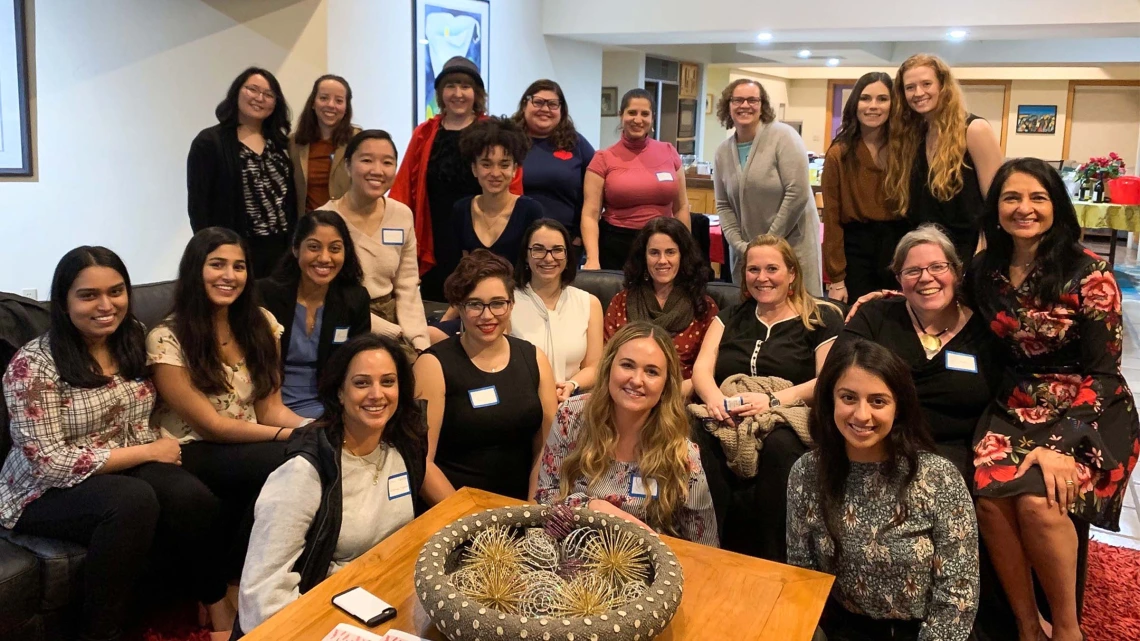
Members of Women in Academic Medicine
Twenty years of changes have not altered the mission of the University of Arizona College of Medicine – Tucson’s Women in Academic Medicine (WAM), a group committed to supporting women with networking and mentorship as they build leadership and community. While their ways of engaging have adapted with the times, WAM’s mission remains strong.
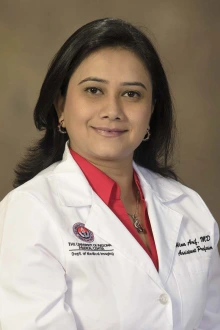
Hina Arif-Tiwari, MD
“It’s the most supportive, collaborative group. I just feel completely filled up, even in times of extreme stress,” said Mari Ricker, MD, professor of family and community medicine. “We have an epidemic of burnout among physicians. An antidote to burnout is sharing your passion, reconnecting with things you’re excited about. It’s an essential part of a physician’s own self-care plan.”
Founded in 1999 by Anne Wright, PhD, professor emeritus of pediatrics, and Kathryn Reed, MD, professor emeritus of obstetrics and gynecology, WAM is now led by Dr. Ricker and Hina Arif-Tiwari, MD, professor of medical imaging. Originally, meetings took place in members’ homes. Two decades later, the pandemic sent WAM to virtual spaces, but could not unravel the sense of solidarity that had been the common thread holding WAM together.
“It’s good to know you’re surrounded by really strong women,” Dr. Arif-Tiwari said. “The soul of WAM is uplifting women, helping women, addressing women’s needs. It’s the fuel that keeps us going.”
“It’s open to anyone, regardless of how you identify,” Dr. Ricker added. “We encourage allies across the college to work toward promoting women in academic medicine.”
Shaking things up
Drs. Arif-Tiwari and Ricker took over the WAM steering committee in 2018, a pivotal time in the group’s history. Thanks in part to the skills they honed in WAM, several of its leaders advanced to prestigious positions on the Health Sciences campus or beyond. But Drs. Arif-Tiwari and Ricker framed those losses as opportunities.
“Hina and I decided to shake things up a little bit,” Dr. Ricker recalled. “We revitalized the steering committee and brought in a lot of new people.”
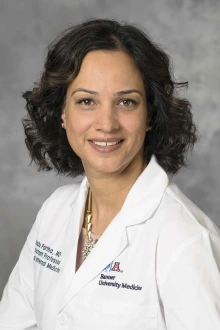
Indu Partha, MD
“Those retreats are a powerhouse,” Dr. Arif-Tiwari said. “We have input from women in different stages in their careers, different backgrounds, different departments and different leadership roles.”
With Indu Partha, MD, clinical assistant professor in medicine, at the helm, WAM established a social media presence, mainly through their Twitter account.
“It has helped get the word out about our programming and increased our audience,” Dr. Partha said. “When faculty post things, whether it’s their own awards, grants, publication successes, we’re able to amplify their successes.”
WAM’s use of social media has extended the group’s reach far beyond Tucson.
“Indu’s work on Twitter has put us on a national platform,” Dr. Arif-Tiwari said. “It has been very impactful.”
“It’s been wonderful finding people across the country who have the same passions and interests,” Dr. Partha added. “Twitter has a real ability in bringing people together and to get the word out about gender equity. There is that sense of community where people think about us to share their successes and quandaries with.”
Pandemic pivots
The pandemic packed a punch for anyone involved in medicine, and WAM continued to provide members with the support and community they needed more than ever.
“This has been the hardest year in medicine,” Dr. Ricker said. “Through virtual events we’ve created, we’ve kept a small flame alive for the women who needed to connect.”
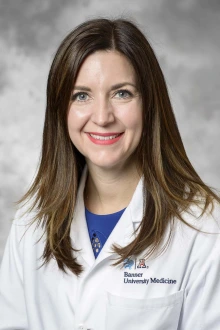
Mari Ricker, MD
WAM hosted a virtual 5K, held a panel discussion of “life hacks” for the COVID-19 era, and launched a series called Fierce Female Fridays to celebrate WAM members overcoming pandemic-related challenges.
Dr. Ricker describes one of their favorite events, virtual speed mentoring, as “hysterically fun and slightly chaotic.” Several accomplished faculty members spoke to small groups on a topic they held dear, such as communication, leadership or passion, and afterward, participants connected with each other for informal discussions.
“It was remarkably gratifying to see an MD/PhD student talking with a vice dean and a chairman of a department,” Dr. Arif-Tiwari said. “Things that connected these women physicians would resonate, irrespective of where they are in their career. Mentoring is necessary at all steps of career, but early career is just the right time because you’re that little bird that’s opening its eyes and trying to see where to fly.”
“It would have been nice early in my career and during my residency to have some kind of mentor to look to for answers that I figured out for myself after more than a little bit of struggle,” Dr. Partha added. “We need to make sure it’s not just scientific knowledge we pass on, but knowledge we’ve all gained as we’ve progressed through our career paths. It’s a part of the makeup of the faculty here to pass on knowledge, and I hope to be a part of something that was not available to me many years ago.”
A sense of belonging
WAM’s roots in the GRACE Project, which more than 20 years ago marshalled carefully analyzed data to push forward salary equity and leadership opportunities for female faculty, made the College of Medicine – Tucson one of the nation’s top medical schools for female-led departments, and the group remains an incubator for strong female leaders. Additionally, members of WAM say the sense of community and camaraderie is what keeps them coming back to the group, whether they find it in informal social activities, networking events or mentorship.
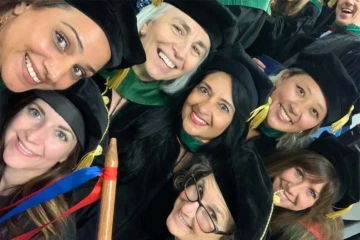
WAM at graduation
Dr. Partha, for example, was already established in her career by the time she came to the College of Medicine – Tucson. But she still saw the value of WAM and the networking it offered.
“It’s given me a sense of belonging, a sense that I’m not alone in feeling the things I’m feeling. There’s joy in helping others and being able to share my experiences,” Dr. Partha said. “And it’s just a lot of fun. Work is work, but we are all humans who enjoy friendships. It’s been great meeting terrific women who I just happen to have the pleasure of working with as well.”

